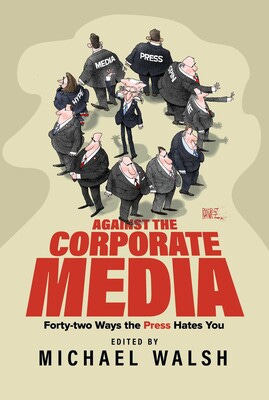'Through the Revolving Door - How the Fourth Estate Vanished'
John O'Sullivan on strange -- or maybe not -- bedfellows.
An excerpt from Against the Corporate Media, coming Sept. 10 from Bombardier Books. "Through the Revolving Door: How the Fourth Estate Vanished," by John O'Sullivan:
For most of my lifetime the balance of temperaments in newsrooms, both in America and the U.K., has been weighted—this is plainly not a scientific judgment—strongly toward the bohemian, rebellious, and creative, and away from the respectable, conformist, and administrative on something like 70 lines to 30 lines. That division strikes me today as a pretty good corporate personality mix if you want to produce a lively, controversial, and unpredictable newspaper, magazine, television, or internet current affairs program. It didn’t track too well with partisan political divides between liberals and conservatives—which was a good thing because it meant that the common journalistic mission could and sometimes did override politics and ideology. Most newsrooms had a liberal majority but relaxed ideological attitudes. Bohemian Tories were more popular than liberal ideologues, for instance, and the most significant question you could ask about any newsroom was “Does it have an esprit de corps?”
That had less to do with the administrative virtues—important though getting expenses paid on time is to basic morale—than with bold and courageous editorial leadership shown by people as different as Arnaud de Borchgrave in The Washington Times, Roger Wood on the New York Post, Andrew Neil on the London Sunday Times, and Colin Welch as deputy editor of the Daily Telegraph. All of them had the necessary buccaneering self-confidence to drive their papers to excel in challenging not only governments but also all the respectable people, institutions, opinions, and causes mired in groupthink and self-congratulation—whom the Brits summarize ironically as “the Great and the Good”—who exercise enormous social and cultural power but too often get a pass when criticisms are being handed out.
Though we didn’t all realize it at the time, the era from the early 1980s to the start of the century was a golden age of journalism financially, technically, and creatively. And that produced freer countries and better governments. Those active in the press of those days drew a high card in the lottery of life…
Read the rest of the excerpt here. And to support our work, please pre-order Against the Corporate Media here. We’ll be running more excerpts from now until publication, so please hit the Subscribe button — it’s free!

